HACC offers exceptional emergency medical services (EMS) training in a variety of learning options, including in person, entirely online and blended.
EMS Certification Credits Now Being Offered
- EMT - 6 Allied Health (AH) Elective Credits
- AEMT - 15 Allied Health (AH) Elective Credits
- Paramedic - 30 Allied Health (AH) Elective Credits
The Senator John J. Shumaker Public Safety Center is a Pennsylvania Department of Health Accredited Certification Training Institute.
The purpose of the HACC AEMT Program is to prepare competent entry-level AEMTs in the cognitive (knowledge), psychomotor (skills), and affective (behavior) learning domains. We pride ourselves on offering a high quality and challenging curriculum, delivered by some of the best experienced instructors and active ALS providers available. HACC's AEMT Program prepares students for the National Registry AEMT Certification (NR-AEMT) and certification by the Pennsylvania Department of Health as an AEMT. This program also offers a clear pathway to the Paramedic Program at HACC.
Advanced EMT Program enrollment requirements:
- Student must be 18 years of age by the first day of the program
- Students must be a certified Pennsylvania EMT
- The tuition is $1,400
- This does not cover the textbook, or national registry testing fees
- Students will need this textbook by the first class - Advanced EMT: Advanced Emergency Care and Transportation of the sick and Injured
- Program minimum hours
- 168 classroom hours (8 hours/week for 21 weeks)
- Please review the course schedule to make sure that you will be able to attend all classes prior to registering.
- Additional time completing online assignments, self-study quizzes, patient care reports etc.
- Clinical Requirements
- 50 Emergency Department Hours
- 50 EMS Field Internship Hours
- 50 Capstone Hours
- These hours are in addition are outside the required classroom time.
- This class is a Pre-Requisite for the HACC Paramedic Program
What can I do with advanced EMT in the workforce?
Explore YOUR career with Career Coach!
What are HACC’s classes like?
Our AEMT Program is a 21 week long program.
It is a combination of self-paced, online modules with assignments and discussions. Students are required to attend in-person lab sessions throughout the program to demonstrate their competency in numerous psychomotor skills, complete testing requirements and prepare for the National Registry of Emergency Medical Technicians (NREMT) examinations.
The skills taught meet the most current version of the National EMS Scope of Practice (2019 and amended 2021), and augment with the skills expected of each provider in the most recent Pennsylvania EMS Scope of Practice as published in the Pennsylvania Bulletin.
- Anatomy and physiology
- Pathophysiology
- Basic and advanced airway management
- Pharmacology
- Advanced pharmacology
- Vascular access and medication administration
- Cardiology, electrophysiology
- Cardiological emergencies, and Resuscitation
- Medical emergencies
- Traumatic emergencies
- Environmental emergencies
- Special populations – Pediatrics, Geriatrics, Obstetrics and Gynecological emergencies.
- Transport operations, Incident management, Triage
AEMT Program require mandatory prerequisite courses listed below.
- Hazardous Materials Response - Awareness
- NIMS IS-100: Introduction to Incident Command System (ICS)
- NIMS IS-200: ICS for Single Resources and Initial Action Incidents (Prerequisites: NIMS 100 and 700)
- NIMS IS-700: National Incident Management System (NIMS), An Introduction
- NIMS IS-800: National Response Framework, An Introduction
EMS Pathways
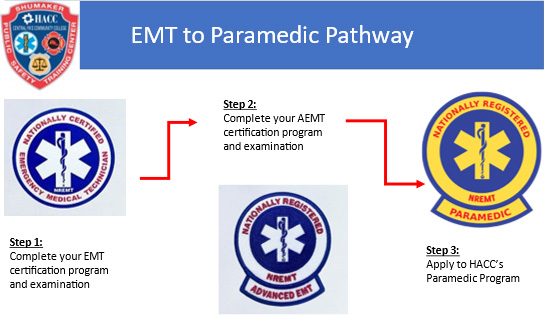
Where and when are classes held?
Harrisburg Campus: Monday Cohort: 8 a.m. - 5 p.m. | Jan. 5 - May 21, 2026
Additional dates: 1/06, 1/20, 5/06, and 5/14
AEMT Program Flyer for Mondays 2026 (pdf)
Harrisburg Campus: Thursday Cohort: 8 a.m. - 5 p.m. | Jan. 5 - May 21, 2026
Additional dates: 5/06 and 5/18
AEMT Program Flyer for Thursdays 2026 (pdf)
York Campus: Friday Cohort: 8 a.m. - 5 p.m. | Jan. 5 - May 21, 2026
Additional dates: 5/06, 5/14, and 5/18
Starting 5/06 - the remainder of York's class sessions will occur at the Harrisburg Campus
AEMT Program Flyer for Fridays 2026 (pdf)
For more information:
The Senator John J. Shumaker Public Safety Center provides a variety of continuing education courses. The Pennsylvania Department of Health accepts the following continuing education credits:
- Clinical Patient Care (CPC)
- Emergency Vehicle Operations (EMSVO)
- Other - Non-clinical
The National Registry accepts state and Commission on Accreditation for Pre-Hospital Continuing Education (CAPCE)-approved education. These include, but are not limited to, community colleges or universities, vocational schools, local EMS agencies or online education providers. EMS conferences, symposiums and workshops are also accepted.
To see if your PA DOH continuing education credits will apply to National Registry, please check www.nremt.org.
For more information on approved online providers, please go to www.capce.org.
For state office information, please visit https://www.nremt.org/rwd/public/states/state-ems-agencies.
What can I do with EMS professional development courses in the workforce?
What classes are being offered??
BLS PreHospital Provider Cert. EMT Refresher
This fully online self-paced course was designed for current or expired EMT, AEMT, Paramedic, PHRN, or PHPE. This self-paced course follows the National EMS Education Standards to provide the pre-hospital provider with current EMS practice to build and refresh their existing knowledge.
Emergency Vehicle Driver Training
16 EMSVO
The course was developed to enable emergency response vehicle drivers to comply with the Pennsylvania statute and to reduce emergency vehicle accidents. At the conclusion of this program the student will be able to: explain the vehicle laws that relate to operation of an emergency vehicle in Pennsylvania; understand the effects on the community, the emergency response agency, and the driver when vehicle accidents occur; describe driving techniques which will insure safe response; and demonstrate the driving skills necessary to safe vehicle operation.
Hazardous Materials Awareness
2 CPC/1.5 Other credits
The goal of this fully online course is to prepare students who – in the course of their normal duties – could encounter an emergency involving hazardous materials or weapons of mass destruction (WMD). Professionals in the fields are expected to recognize the presence of a hazardous material/WMD, call for trained personnel to assist, secure and protect the area. This course serves as initial training as required under 29 CFR 1919.120 and the educational requirements of NFPA 472 standard to the Awareness Level.
Tactical Emergency Casualty Care (TECC)
16 CPC credits
This 16-hour course covers topics designed to decrease preventable death in tactical situations. Topics include hemorrhage control; surgical airway control and needle decompression; strategies for treating wounded responders in threatening environments; caring for pediatric patients; and techniques for dragging and carrying victims to safety. The core of the program focuses on three distinct phases of care that have been well-proven by TECC-trained personnel. TECC focuses on the medicine during these phases of care and provides guidelines for managing trauma in civilian tactical or hazardous environments.
View and register for Continuing Education offerings
For more information:
This course is for first responders at the scene of a trauma or medical emergency. Upon successful completion of the EMR Program, students are eligible for their EMR certification exams. Students must be at least 16 years old before the first day of class.
Please note:
- Tuition for the EMR Program is $475.
- Students are responsible for obtaining the textbook.
- The required textbook for this course is: Emergency Medical Responder: Your First Response in Emergency Care, Sixth Ed., AAOS
- Certification exams are administered by the Pennsylvania Department of Health–Bureau of EMS/National Registry of EMTs (psychomotor) and the National Registry of EMTs/Pearson-Vue test centers (cognitive).
- There is a separate fee associated with the cognitive exam that is paid to the National Registry of EMTs.
What can I do as an emergency medical responder (EMR) in the workforce?
What are HACC’s classes like?
Our online/blended EMR program is a combination of self-paced online modules with interactive assignments and discussions through the Desire2Learn (D2L) online platform. Students are required to attend in-classroom lab sessions throughout the program to demonstrate their competency in numerous psychomotor skills, complete testing requirements and prepare for the National Registry examinations.
The EMR program requires mandatory corequisite courses listed below. The due dates for these courses are determined by your specific course syllabus and are to be completed in order to be eligible for your NREMT EMR certification exam. More information will be provided at the first class.
- Hazardous Materials Response - Awareness
- NIMS IS-100.B: Introduction to Incident Command System
- NIMS IS-200.B: ICS for Single Resources and Initial Action Incidents (Prerequisites: NIMS 100 and 700)
- NIMS IS-700.A: National Incident Management System (NIMS), An Introduction
We encourage you to complete the Self-Assessment for Online Learning to determine your potential aptitude for this learning platform. Students enrolling in the blended programs are expected to have a basic understanding of basic Internet navigation methods that include:
- Browser navigation
- Navigating to web addresses
- Search terms
- Utilizing bookmarks
- Utilizing hyperlinks
This entry-level training course is for first responders at the scene of a trauma or medical emergency. Upon successful completion of the EMT Program, students are eligible for their EMT certification exams.
The program is offered in both an in-person and an online/blended format. We encourage you to complete the Self-Assessment for Online Learning to determine your potential aptitude for online learning. Students enrolling in the blended program are expected to have a basic understanding of Internet navigation methods that include browser navigation, utilizing bookmarks, search terms, navigating to web addresses and utilizing hyperlinks.
Please note:
- Students must be 16 years old or older before the first day of class.
- We will not accept registrations less than 14 days before the program start date.
- Payment is due at the time of registration.
- Companies can complete an online Registration with a Permission to Bill form here!
- Tuition for the EMT program is $925.
- The textbook is not included. It is the responsibility of the EMT student to obtain the required textbook for the EMT Program. Students MUST have a textbook by the first class. The required textbook is: Emergency Care and Transportation of the Sick and Injured Essentials, 12th ed.
- The textbook may be obtained directly from the publisher or other retailers such as Amazon.
- Students are required to wear a uniform to every class session. HACC provides uniform shirts. Students are responsible for navy blue work pants, black work boots, and a black belt.
- These exams are administered by the Pennsylvania Department of Health–Bureau of EMS/National Registry of EMTs (psychomotor) and the National Registry of EMTs/Pearson-Vue test centers (cognitive).
- There is a separate fee associated with the Cognitive exam (Approximately $110/attempt) that is paid to the National Registry of EMTs.
- As of January 1, 2026, all students must have a completed FBI criminal background check in order to create an application for the Department of Health. Applications submitted without an FBI background check will not be accepted and returned to the student. Failure to have a completed application will prohibit the student from taking the required NREMT exams and therefore prohibit the student from certification. The background check cannot be more than 90 days old at the time of submission of the application. You can obtain your background check by applying for an FBI Criminal History Background Check on PA.gov and clicking “Make an appointment to start your application.”
- New Requirements for FBI Background Checks How To (pdf)
What can I do as an emergency medical technician (EMT) in the workforce?
Explore YOUR career with Career Coach!
What are HACC’s classes like?
Our online/blended EMT Program is a combination of self-paced, online modules with interactive assignments and discussions. Students are required to attend in-person lab sessions throughout the program to demonstrate their competency in numerous psychomotor skills, complete testing requirements and prepare for the National Registry of Emergency Medical Technicians (NREMT) examinations.
The EMT course is 220 hours of instruction that covers the following in accordance with the National EMS Education Standards:
- Anatomy and physiology
- Assessment of injuries and illnesses (medical and Trauma)
- Assisting patients with their own prescribed medications
- Cardiopulmonary resuscitation (CPR) and automated external defibrillation (AED)
- Environmental emergencies
- Lifting, moving and transportation of patients
- Pediatric and geriatric emergencies
- The overall roles and responsibilities of the EMT
Both the in-classroom and blended EMT Programs require mandatory corequisite courses listed below. The due dates for these courses are determined by your specific course syllabus and are to be completed in order to be eligible for your NREMT certification exam. More information will be provided at the first class.
- Hazardous Materials Response - Awareness
- NIMS IS-100: Introduction to Incident Command System (ICS)
- NIMS IS-200: ICS for Single Resources and Initial Action Incidents (Prerequisites: NIMS 100 and 700)
- NIMS IS-700: National Incident Management System (NIMS), An Introduction
- NIMS IS-800: National Response Framework, An Introduction
View and register class schedules
For more information:
Applications
- AEMT requires an application and acceptance into the program. You must be a certified EMT to apply. Apply Here
- Paramedic requires an application and acceptance into the program. You must currently be a certified AEMT to apply. Apply Here
- Pre-Hospital Registered Nurse requires an application and acceptance into the program. You must be a PA Registered Nurse to apply. Apply Here
Tuition and Financial Support
| Program | Tuition* |
| Advanced Emergency Medical Technician | $1,400 |
| Paramedic | $8,000 |
| Pre-Hospital Registered Nurse | $1,800 |
*Does not include the cost of textbooks or national registry testing fees
Payment Plans: Upon acceptance into a Program listed above, you may qualify for a payment plan. You can schedule a registration and payment plan enrollments here: :
Please visit the following HACC webpages for more information about:
ALS Certification Credits Now Being Offered
- AEMT - 15 Allied Health Elective Credits
- Paramedic - 30 Allied Health Elective Credits
Background Checks and Clinical Compliance
All background clearances are due prior to beginning your clinical rotations. A delay in submitting your background clearances will delay the start of clinicals.
Please use this form to submit your background checks: https://www.cognitoforms.com/HACC2/EMSStudentClinicals
Please refer to the documents below for information about:
- Pennsylvania State Police Criminal History Record Information (CHRI)
- Pennsylvania Child Abuse History Certification
- Federal Bureau of Investigation Federal Criminal History Background Check
- Physical Exam and Required Immunizations (pdf)
- 12 Panel Drug and Alcohol Screens
Test-In Process
If you meet the criteria in the flow chart shown below, you must attend a test-in session. The test-in session includes a written test and a scenario-based baseline skills/patient assessment.
The purpose of the HACC Paramedic Program is to prepare competent entry-level Paramedics in the cognitive (knowledge), psychomotor (skills), and affective (behavior) learning domains. We pride ourselves on offering a high quality and challenging curriculum, delivered by some of the best experienced instructors and active ALS providers available. HACC's Paramedic Program prepares students for the National Registry Paramedic Certification (NR-P) and certification by the Pennsylvania Department of Health as a Paramedic.
Accreditation
The Paramedic Program is accredited by the Commission on Accreditation of Allied Health Education Programs (www.caahep.org) upon the recommendation of the Committee on Accreditation of Educational Programs for the Emergency Medical Services Professions (CoAEMSP).
Commission on Accreditation of Allied Health Education Programs
727-210-2350
www.caahep.org
Commission on Accreditation of Educational Programs for the Emergency Medical Services Professions
214-703-8445
www.coaemsp.org

Program Goal
The Harrisburg Area Community College paramedic program’s goal is to prepare Paramedics who are competent in the cognitive (knowledge), psychomotor (skills), and affective (behavior) learning domains to enter the profession.
Please note:
- Students must be a certified Pennsylvania Advanced EMT
- The tuition is $8,000. This does not cover the textbooks, or the national registry testing fees
Paramedics perform various duties, including (but not limited to):
- Emergency medication administration and calculation
- Insertion of intravenous and intraosseous lines
- Obtain and interpret electrocardiographs (ECGs) and administer electrical therapy
- Perform advanced airway management
- Recognize, assess and treat medical and traumatic emergencies
- Provide solutions to complex problems in stressful environments
In 2023:
- 100% of our students passed the NREMT/State Written Exam.
- 81.3% of our students successfully completed the program.
- 100% of our students found a job in the field.
What can I do as a paramedic in the workforce?
Explore YOUR career with Career Coach!
What are HACC’s classes like?
The paramedic program is offered as a Daytime or Evening Program. These classes consist of in-person classes, online work, and clinical rotations.
Clinical Requirements: View our Clinical FAQs here! (pdf)
Where and when are classes held?
Classes are offered at the Senator John J. Shumaker Public Safety Center on HACC’s Harrisburg Campus.
Harrisburg Campus: Jan. 5, 2026
Paramedic Program Flyer 2026 (pdf)
For more information:
The Senator John J. Shumaker Public Safety Center is a Pennsylvania Department of Health Accredited Certification Training Institute. This course is for currently licensed Pennsylvania registered nurses (RN). It enhances existing professional and clinical experience. Prior to enrolling, you should have a solid foundation in anatomy and physiology, pharmacology and cardiology.
Upon completion of the course, you will be eligible to take the Pennsylvania Department of Health certification exam(s).
- The tuition is $1,800. This does not cover the textbooks, or the national registry testing fees
What can I do as a pre-hospital registered nurse (PHRN) in the workforce?
Explore YOUR career with Career Coach!
What are HACC’s classes like?
This program serves as an introduction to EMS and the prehospital care of the sick and injured. The PHRN program provides the knowledge and skills required to allow a Registered Nurse (RN) the opportunity to become an advanced level Emergency Medical Services (EMS) provider, functioning in a role similar to a paramedic. View our Clinical FAQs here! (pdf)
The curriculum covers emergency medical technician (EMT) skills; cardiology and advanced cardiac life support (ACLS); medical emergencies; trauma; operations; triage; rescue medicine; and more.
The content is delivered through classroom lecture, discussion, practical application in integrated lab sessions, and competency testing. Students are also required to participate in clinical hours at EMS field sites outside of the classroom.
PHRN students will be taught to:
- Rapidly assess injuries and illnesses
- Identify and treat all types of shock
- Provide care of musculoskeletal injuries
- Manage various medical emergencies
- Properly lift and move patients
- Demonstrate competency in both basic and advanced airway management and trauma treatment techniques
- Determine the most appropriate method to transport patients to the emergency department
At the completion of the program, PHRN students will be eligible to take the Pennsylvania Department of Health certification exam(s).
This program will meet in person, one day per week throughout the duration of the program. You will also need to complete the following:
- Online assignments
- 132 clinical hours throughout the duration of the program
Clinical hours are in addition to classroom hours. Students will have the flexibility to their clinical schedule with HACC's existing clinical throughout Central Pennsylvania.
Students will be required to complete this a series of clearances to participate in the clinical portion of the program.
Where and when are classes held?
In-person classes are offered at the Senator John J. Shumaker Public Safety Center on HACC’s Harrisburg Campus.
Harrisburg Campus: Jan. 5, 2026
PHRN Program Flyer 2026 (pdf)
For more information:
For additional course information, please email emstrng@hacc.edu.
You May Be Eligible for a Scholarship!
Start Here!HACC EMS Training Core Values
At HACC’s Shumaker Public Safety Center, our EMS training is grounded in four essential core values. These values not only guide how we educate future EMS professionals, but also define how we serve our communities with integrity and compassion.
Service: The unselfish acts done for others in need and for those who cannot do for themselves. Service is a mindset that drives decisions in the best interest of another—simply because it’s the right thing to do for a fellow human being. It is both competence and kindness in caring for the sick and injured.
Integrity: The congruence between what we believe is right, what we communicate to others, and how we behave in the world. Integrity is the promise made by every EMS provider who wears the patch—to serve with honesty, respect, and professionalism.
Compassion: Where empathy—the ability to see ourselves in the experiences of others—blends with action. Compassion is the motivation and the decision to relieve another’s suffering through our abilities as providers. It is a true measure of our humanity.
Courage: The value that enables the expression of all other values. Speaking up, stepping forward, listening with intent, and extending a helping hand all require the courage to act—especially in moments of uncertainty or fear.
These values are at the heart of everything we do at HACC EMS. They shape not only how we train, but how we lead, respond, and serve in the field.
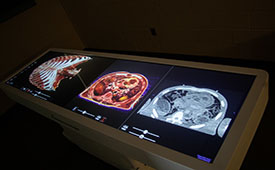  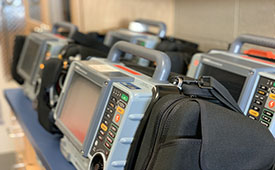 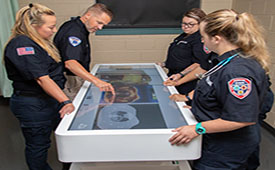 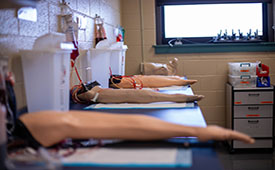 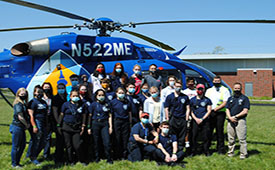 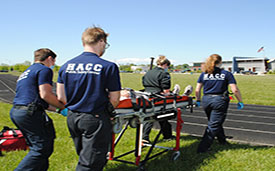 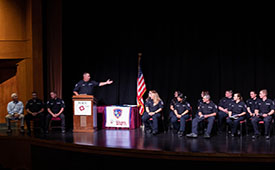 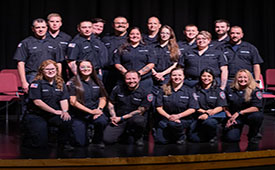 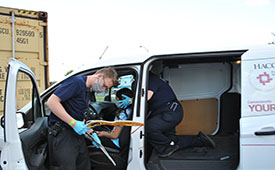 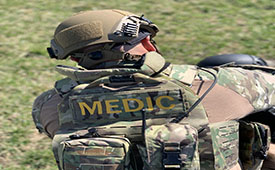 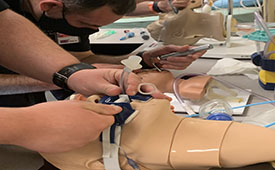 |


